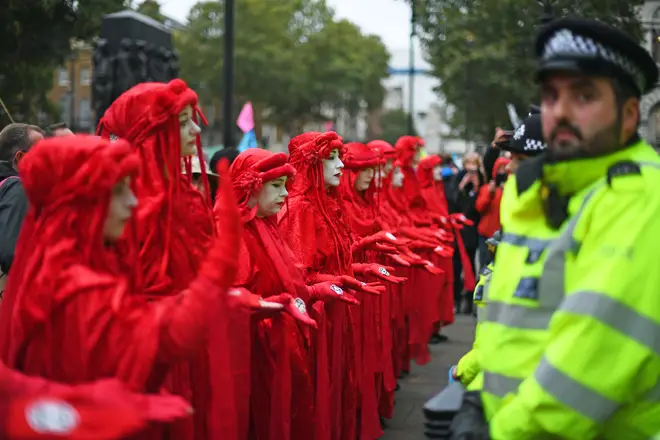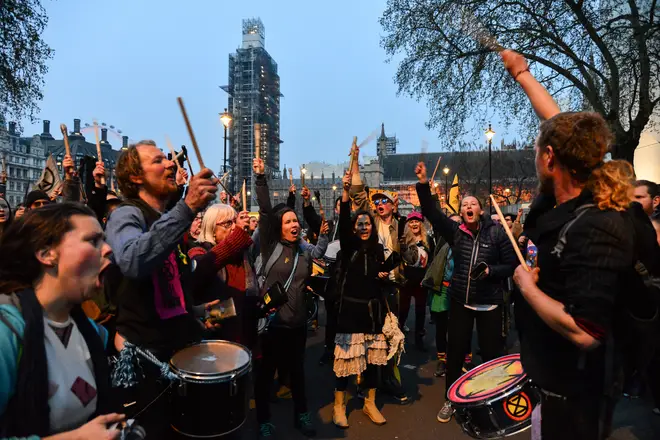
Vanessa Feltz 3pm - 6pm
3 February 2020, 09:05

What's it like to report on an Extinction Rebellion protest? As Nick Ferrari launched his Enough Is Enough campaign, Rachael Venables says their protests are undoubtedly effective, but asks if the public starting to tire of the disruption?
The first time I heard of Extinction Rebellion was November 2018. It was during three very cold mornings in London, when groups of no more than a few dozen people at a time were targeting key roads in the city at rush hour. I’d get a call from our travel desk, and race to the likes of Vauxhall Bridge and Elephant and Castle.
It was a pretty striking protest. The group would pick a busy road or junction, and when the traffic lights turned red they would slowly walk out into the road, unfurl a large banner saying things like “Climate Justice” and stand there for 7 minutes at a time. They would block traffic, watched by the police, before walking back in for two minutes – easing the flow slightly. And repeat. It caused some incredible snarl ups.
What’s more, based on the huge presence of myself and other journalists, it was exceptionally effective way of getting attention with a relatively small amount of people.
It was clear the campaigners were prepared. They had fliers explaining their motives, bags of sweets to offer the disgruntled drivers, and would stand politely when the abuse started flying.
I saw one primary school teacher on a delayed school trip march up to the group, and scream that they were a bunch of ****s who’d ruined his pupils’ day, and how dare they impact so many people?
They’d just shake their heads and apologise for the disruption: “We don’t want to be here anymore than you want us to.”
What I found so interesting though, is how at first, people like that teacher were absolutely in the minority. In November, and again during the following April Rebellion, I’d dart through the traffic and speak to drivers about how they felt, only for the vast majority to shake their heads and say “I’m glad they’re talking about the climate, something has to be done.” I guess if being an hour late for work was their contribution to tackling climate change – then so be it. It made them feel good to play a part.
Londoners walking to work across Waterloo Bridge were largely the same. One XR protester even told me he’d been arrested the previous day with a member of the public, who was so inspired by their campaign she sat down next to him and let herself be carried off by the police.
That’s not, of course, to minimise the disruption. Ordinary people were badly impacted. We heard of hospital patients being late to, or even missing appointments, gridlocked taxi drivers struggled to take fares, and the one business group predicated a loss to West End companies of up to £12 million.
But, you cannot deny that at the start of this movement, there was an enormous amount of goodwill from the public. I think there was also something honest about being them being willing to be arrested on masse, but co-operating with the police. That was both practically clever from their point of view as it successfully drained police resources, and again, it was impactful for the public to see these images of people young and old, men and women, being carted away by officers.

It also helps that XR are exceptionally clever about their image. These protests are (there’s no way around it) pretty fun to cover. Everything is bright and colourful, there are drummers, music blasting out on sound systems, yoga and free (vegan) food. They party around boats and walk giant octopuses down Whitehall. On a more serious note, they ban all alcohol and drugs from their sites, and put up wellbeing tents for anyone who needs some support.
But there have been mistakes, and with them, support is clearly starting to wane. Targeting airports like London City and Heathrow are obvious examples. The public clearly struggled to understand the logic there, and to top it all off, the attempts all failed as the police turned out to be more than prepared.
Another example is the disastrous Canning Town protest. That infamous video of protesters being pulled from a train roof and set upon by a mob of commuters was a stark reminder of how quickly people can turn, and these people were fed up. It was also unwise from a PR perspective. On the bus on the way home that day I heard two young women talking about the stunt: “how stupid are they? Targeting public transport which is so much more environmentally friendly?”
Extinction Rebellion understand what they were trying to do –by crippling public infrastructure they hoped to hold the Government to ransom. But that was not the result, and all the stunt did was be labelled “an own goal” by its own members.
It's not just the public starting to tire. During the first few days of April’s protests the police seemed to me to be cautiously calm about the campers. One officer at Oxford Street told me he’d never policed a friendlier protest: “they even pick up their own rubbish!” But, by the end of the year, the Met were stretched to breaking point. You could feel the tension growing. One officer in October told me he’d been finishing work at “one, two o’clock in the morning, and coming back on shift for 6am.”
They know this has an impact on their work elsewhere in city, while bosses have expressed over and over again, in interviews and press briefings, the awkwardness of their legal position. They see themselves stuck between what the law allows the protesters to do, and how far their powers can stretch to stop them doing it.
So, the real question is what next? Extinction Rebellion now firmly have the media, public and politicians’ attentions. But after a year of hard graft they’re not really any closer to achieving their three goals.
So what do they do now? Do they risk more alienation by catering to the growing extremes in their ranks? Or do they pull back, continue to grow as a mainstream group – but risk the novelty in their stunts starting to wear thin?
Hear more from Nick Ferrari's Enough Is Enough campaign all this week on Nick Ferrari At Breakfast on LBC.